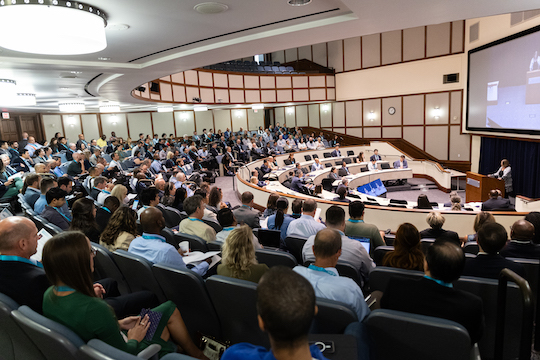Rice University experts discuss on impact of Inflation Reduction Act
Renewable Energy Alliance Houston (REAL Houston) and Rice Business Executive Education hosted the second annual Renewable Energy Leadership Conference Aug. 22 on Rice’s campus to explore the impacts of the Inflation Reduction Act (IRA) one year after it was signed into law.
The discussion provided an opportunity for voices from leading renewable energy companies, the U.S. Department of Energy and capital providers to discuss the impact the IRA has had on Houston and beyond, and what to expect going forward.
REAL Houston Board Chair Kay McCall said the act was a significant change for U.S. energy policy.
“The impressive array of historic investments made in renewable technology, carbon capture and storage, hydrogen and more demonstrate the concrete steps we are taking toward a lower-carbon future,” said McCall. “What we heard from the diverse voices gathered here today — all but one from Houston — bodes well for the coming decades in energy and for Houston’s role in transforming the industry.”
John Berger, CEO of Sunnova Energy, said the IRA’s expansion of federal tax incentives has resulted in a surge of investments in the renewable and clean energy section.
“A year into its enactment, this transformative legislation continues to yield dividends, equipping both residential and commercial customers — including those in historically underserved communities — with a more affordable and more reliable source of energy,” Berger said.
The growth opportunity created by the IRA has allowed clean energy projects to accelerate at a faster pace, said EDP Renewables North America CEO Sandhya Ganapathy.
“The IRA’s incentives and subsidies are also helping to lower electricity costs for consumers and make already affordable renewable energy even more economical,” Ganapathy said. “This legislation has created a fantastic opportunity for our industry and for consumers who want clean energy at affordable prices.”
As a premier business school, Rice Business is proud to unite diverse stakeholders with the common purpose of revolutionizing renewable energy, said Michael Koenig, associate dean for innovation initiatives and executive director of executive education.
“With unwavering commitment, we steer toward a greener future, knowing businesses redefine energy’s landscape,” Koenig said.

